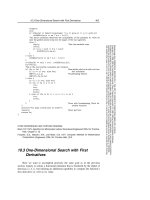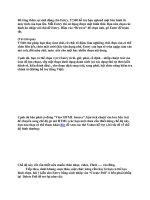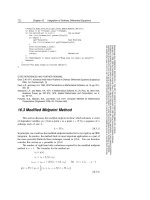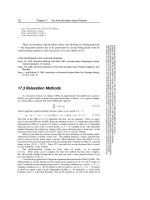Tài liệu Opportunities in technical writing careers part 4 ppt
Bạn đang xem bản rút gọn của tài liệu. Xem và tải ngay bản đầy đủ của tài liệu tại đây (98.05 KB, 10 trang )
ing modes, and your chances for success also will be greater. It has
long been known that writers who can prepare the most articulate
oral and written presentations are better equipped for good jobs
and for regular promotions than those who do not communicate
well. Every report we have seen, every questionnaire filled out by
technical communicators now holding important management
positions, attests to this fact: the author knew how to write well,
how to present proposals, and how to speak convincingly.
Problems Faced by Technical Writers
The phrase media intake implies that communication has at its dis-
posal more media and channels of information than were conceived
possible just a few short years ago. As with the scientist, more infor-
mation reaches and is available to the writer than can be assimilated
in a short period of time. This can frustrate a writer, who may feel
inundated by this ever-increasing tidal wave of information. In this
vein, the late President Kennedy is reported to have said, “I’m read-
ing more and more and enjoying it less and less.”
There isn’t any simple or rational solution to this problem. Ear-
lier in this chapter, you read that the most successful technical
writer must necessarily become an eternal student. You will have to
spend many hours reviewing mountains of information just to keep
up to date. For example, consider the story of the Hollywood agent
who was fired by an actor for failing to get him a choice role. The
agent protested and proceeded to give the actor a long list of accom-
plishments on his behalf. The actor responded, “Yes, I know. But
what have you done for me lately?” Unfortunately, this little
vignette is true everywhere people work for others. So, to ensure
your continued value and employability, you must stay current and
The Field of Technical Writing 21
on top of things in this fast-moving world, where employees can
be quickly replaced.
Because your technical writing career will include dealing heav-
ily in human communications, you must maintain effective per-
sonal interaction. If you find yourself wondering why you aren’t
getting responses to your requests, why you are not receiving the
same information other members of your staff are getting, or why
some of your meanings are being distorted by your readers, then it
might be time to reevaluate the way you are communicating. To
minimize these problems, you must keep all lines of communica-
tion open, and your communication must be clear and active.
Other communication problems may arise between you and the
people you work with and write for. Don’t be surprised if scientists
and engineers think and behave differently than you do and if they
apply different meanings to words. This also may apply to your
readers. You will be expected to adapt yourself to them because
most of them won’t change their ways for you.
Marshall Field, the great entrepreneur, once said, “The customer
is always right. So, give the lady what she wants.” Because of this,
you must learn how to address your words and writing and to use
language that is appropriate to your audience. All of these issues
emphasize that the field of technical writing is an ever-evolving pro-
fession with ever-changing demands.
22 Opportunities in Technical Writing Careers
2
Training for
Technical Writers
Every professional working in a technical field—from the elec-
tronics engineer designing a user’s manual for a new product to the
biologist writing an environmental impact report to the account-
ant explaining an auditing procedure to a client—must be able to
communicate ideas effectively.
There are two main ways to become a technical writer. The most
traditional way has been on-the-job training; however, the ideal sit-
uation in which you can learn this field is to major in technical
communications in college. This will help you to not only learn to
master the mechanics and techniques of writing, but to be well-
grounded in science and technology as well. Not every college and
university offers such a curriculum, but with the large number of
schools throughout the United States and Canada that do, finding
a program shouldn’t be too difficult.
Most technical writers are graduates of four-year programs and
have earned bachelor’s degrees. Some have master’s degrees gained
23
Copyright © 2008 by The McGraw-Hill Companies, Inc. Click here for terms of use.
through specialized course work beyond their undergraduate study.
However, a growing number of technical writers have graduated
from two-year and community colleges.
It is, of course, possible to become a technical writer directly
after high school graduation, as you saw in some of the job adver-
tisements in Chapter 1. However, recent reports issued by the Soci-
ety for Technical Communication show that the level of education
for writers has risen considerably over the past two decades. Based
on this information, you can see that most employers believe that
someone fresh out of high school wouldn’t have acquired the skills
or experience necessary without further training to be successful at
technical writing.
Background You’ll Need
What constitutes good training? We have selected the views of two
professionals whose years of experience in the field qualify them to
address the educational needs of the prospective technical writer.
Fred W. Holder, who has written a great deal about communica-
tion, has this to say.
Ideally, a candidate should have a bachelor’s degree in engineering
(in the particular specialty with which you’re dealing) and a mas-
ter’s degree in English, journalism, or another field requiring a
sound background in written communication. . . . I’ve found that
people with sixty to ninety credit hours of college work covering
English, journalism, mathematics through calculus, physics, chem-
istry, and a wide range of other subjects make excellent technical
writers.
Marguerite F. D’Amico, a director of technical communications
for international corporations, expresses her views.
24 Opportunities in Technical Writing Careers
There are three essential requirements for those involved in trans-
lating and presenting technical ideas: a solid foundation in the
basic sciences and some understanding of how they relate to tech-
nology; an understanding of how to organize and present concepts
clearly, logically, and graphically; and a sensitivity to the standards
and needs of those receiving and supplying the information.
What does it all add up to? It simply means that technical writ-
ers will need more and more formal education as time goes on. In
discussing technical writing education, some general principles
apply.
Differences Between Technical
Writing and Technical Editing
Most companies differentiate between technical writing and tech-
nical editing. Editing requires a person who is adept at improving
the composition end of writing by correcting grammar and punc-
tuation, style, and construction of sentences and paragraphs. Tech-
nical writing, on the other hand, encompasses the whole process.
It takes in editing, of course, but it extends to original writing as
well as the rewriting of other people’s manuscripts. The writer must
have a firm grasp of the technical material to cope with this kind
of assignment.
For the rather restricted job of technical editing, it is generally
agreed that solid training in English composition will serve you
well. A prospective technical editor also should, of course, have an
affinity for technological subjects and familiarity with engineering
and scientific terms. For the writer who must deal in-depth with
technical subjects, a firm foundation in science and engineering is
essential.
Training for Technical Writers 25
It almost goes without saying that to work as either a technical
writer or editor, you must be computer literate. In addition to using
word processing programs to write, you’ll need the ability to use a
variety of databases and software programs for research and infor-
mation storage and retrieval.
Courses in Technical Writing
Depending on the university, you will find courses in technical
writing offered in many different departments, including English
and other humanities-based departments, communications, jour-
nalism, business, the sciences, and engineering.
In recent years, colleges and other schools have recognized that
engineering students, for example, should be taught not only
English composition, but should also be exposed to courses in tech-
nical writing. These courses are usually taught by members of the
English department in an engineering college or by teachers of engi-
neering who have an interest in writing. They deal with special
forms of technical writing such as report writing and the prepara-
tion of scientific papers and magazine articles.
As a result of the formation of various technical writing societies
and the great need for technical writers, industry and the technical
press have taken more interest in what is being taught by colleges.
Every year the Institute of Electrical and Electronics Engineers
(IEEE), with more than 370,000 members, holds a special session
titled “Engineering Writing and Speech.” During this session, sem-
inars and panel discussions on the training of engineers are held to
foster clearer and more informative written communications and
to improve the relationships between engineers and technical writ-
ers. The result of this two-way process has been the introduction
26 Opportunities in Technical Writing Careers
of many fine technical writing courses and four-year programs into
a number of colleges and universities.
In addition to technical writing courses, a considerable number
of schools now offer majors in this specific discipline. The programs
have various names and can be found in communication- or
humanities-oriented departments under such course titles as science
writing, science information, technical journalism, and technical
communications.
Choosing the Right Program
There are two important things to consider when choosing an edu-
cation program. First, you must determine which programs and
courses are available; then you must decide whether they will pro-
vide the skills you’ll need once you are employed.
We carried out a study of this very subject among a group of
technical writers. These are the answers broken down into three
categories:
What Are Your Present Duties?
Professional (preparation of):
Computer manuals
Hardware manuals
Reports and proposals
Audiovisuals
Brochures
Layout
Management:
Writing
Supervising
Consulting
Training for Technical Writers 27
Production
Operations
Editorial management
Training programs
Publicity:
Writing technical articles
Placing technical articles
Preparing brochures
Preparing newsletters
Academic:
Teaching technical writing
Teaching media instruction
Teaching English composition
What Other Courses Should Be Included in the Curriculum
in Addition to Technical Writing?
Science or engineering courses
Media courses using CDs and DVDs
Oral presentations
What Courses Should Be Taken Outside the Technical
Writing Field?
Management administration
Sociology
Industrial psychology
Computer science
Graphic arts
Photography
Printing
28 Opportunities in Technical Writing Careers
You may be able to extract a couple of pointers from this infor-
mation. First, decide what kind of technical communication job
you are aiming for—writing or editing. Then you need to know
what area you think you are qualified for, such as dealing with
reports, manuals, papers and articles, publicity, or advertising. You
must also think in terms of specialization, whether in computers,
science, medical, or any of the other areas discussed in Chapter 1.
Finally, you should find a college that meets your requirements.
Peterson’s Guide to Four-Year Colleges lists many schools in the
United States and Canada that offer B.S. degrees in technical writ-
ing. Enough information about entrance requirements and approx-
imate cost is included to allow you to decide which schools you wish
to contact for further information. You can visit www.petersons.com
to search for programs and schools. Once you’ve found schools that
interest you, visit their websites and request catalogs to learn about
course descriptions and other important information.
Sample Programs
To illustrate the variety of programs available, we have randomly
selected a number of schools and briefly outlined their technical
writing programs. Notice the diversity of departments that offer
degrees in technical writing.
Undergraduate Programs
Brigham Young University
English Department
Provo, UT 84602
/>Training for Technical Writers 29
Students can pursue a B.S. in English with a technical commu-
nication emphasis. In addition to English courses, the department
offers classes in technical writing, editing for publication, document
design and portfolio, studies in language and rhetoric, and an aca-
demic internship.
Additional courses are available in computers and academic pub-
lishing, oral business communication, desktop publishing, elec-
tronic publishing, elementary computer applications, and magazine
writing, editing, and publishing.
Capilano College
Communications Department
North Vancouver, BC V7J 3H5
/>In addition to a B.A. with a concentration in technical writing,
the department offers a fifteen-credit certificate program in pro-
fessional communications, which teaches generalist communication
skills for business, communications industries, or the applied arts.
Graduates have the skills needed to plan and write correspon-
dence, business and technical reports, proposals, promotional mate-
rials, Web content, speeches, presentations, and visual media
materials.
Carnegie-Mellon University
English Department
Pittsburgh, PA 15213
The program includes two tracks, one in technical communica-
tion and one in scientific and medical communication. Both begin
with a core of foundation courses in print and online communica-
30 Opportunities in Technical Writing Careers









